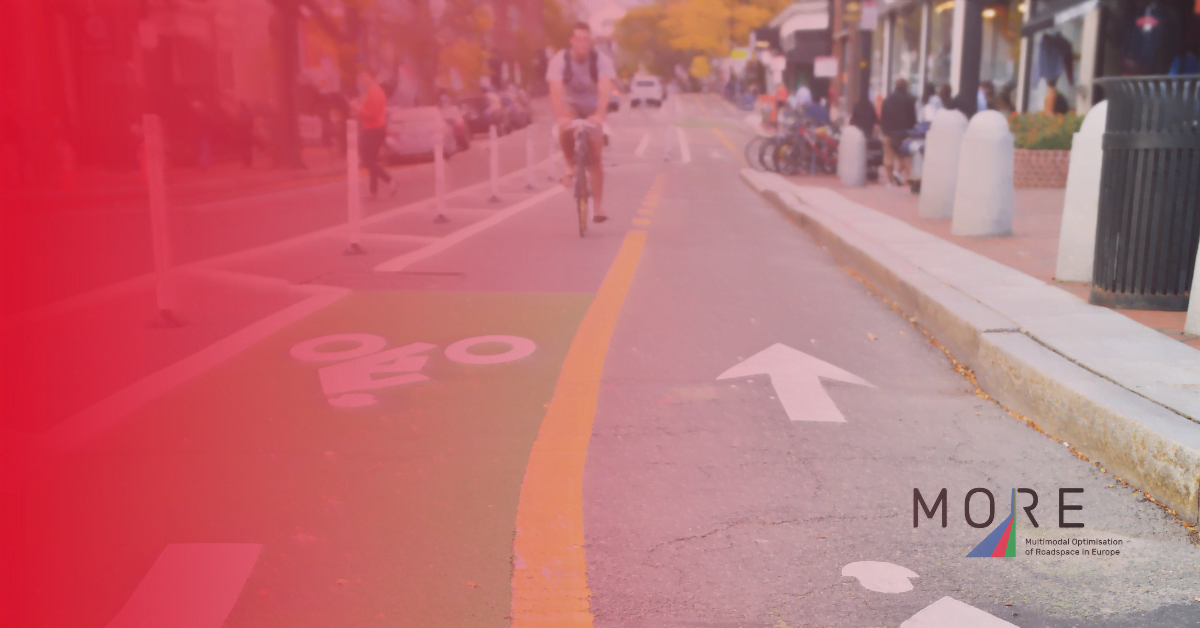MORE project successfully wraps up!
The MORE final event, “Better streets for better cities”, took place in Brussels on 17 February 2022.
As the MORE project drew to a close, the experts and practitioners who have contributed to shaping innovative concepts and tools for the reallocation of road space gathered in Brussels to present their experience and findings.
Over the past three years, MORE has worked to identify existing and future pressures on busy roads connecting five European cities with the Trans-European Transport Network (TEN-T). Such pressures include factors such as demographic change, technological advances, economic growth, and the evolution of lifestyles.
On 17 February, the event addressed the concepts, context and challenges of street design, and provided participants with an opportunity to get acquainted with the street redesign process developed by MORE. Representatives from the cities of Budapest, Constanta, Lisbon, London and Malmö shared their experiences and tips for success.
New process and tools to design the city of places
Urban policy objectives are evolving. European cities are pursuing bold visions to transform from car-oriented cities to cities of places that promote sustainable urban mobility and better and more resilient urban environments, favouring street activities and social interactions. The tools and processes developed by MORE guided transport and planning authorities in this process by engaging residents and stakeholders and considering the needs of all users.
Conference’s key takeaways
The conference was an excellent scenario to put an end to three years of productive work done in the project and share all the different information and experience gathered in experimenting with holistic approaches and new solutions for improving urban street (re)design and space (re)allocation. Partners, guests and the public came together to discuss how to rebalance our streets, improve the quality of urban life, and prepare our cities for current and new challenges.
POLIS’ Secretary General Karen Vancluysen opening statement talked about the excitement of having the MORE cities and partners share their experiences within the project. Following was Matthew Baldwin, Deputy Director-General DG Move and Chair of EU emission for 100 Climate Neutral and Smart Cities. He discussed how the sustainable transition of urban mobility will be crucial for the success of the green deal and how cities need to change their attitudes towards car use to support changes in the habits of their citizens. Pascal Smet, the Secretary of State of Brussels- Capital Region responsible for Urbanism, then showed a series of implementation actions that Brussels is doing to support such changes, confirming that street space reallocation is crucial to improve quality of life.
The morning session continued with the MORE partners presenting all the concepts that allowed the project to be tested and implemented in the cities. Their presentations provided the audience with a comprehensive understanding of the topics essential for appropriating street (re)design and space (re)allocation, considering challenges and opportunities faced by cities, the need for new policies and regulations, and the role of technologies.
In the afternoon session, MORE partners explained the process and tools developed and improved within the project, and the MORE cities – Budapest, Malmo, London, Lisbon, and Constanta – showcased how they used and tested them in their own context. The cities could present the most pressing issues they had on their street sections and how the MORE process provided support with dealing and rethinking them. They highlighted the relevance of citizens’ and stakeholders’ involvement in being part of the process and the changes needed to take actions towards new ways of rethinking our streets.
Check below the complete recording!
For presentations, click here.
MORE held four online sessions at the end of February 2022
Experts and practitioners working on the MORE project additionally held four online, post-Final event sessions to discuss hot topics such as bringing life back to streets, what’s next for the TEN-T policy in Europe following the launch of the new Urban Mobility Framework, and the advances in technologies and future scenarios for urban mobility.
A dedicated session presented the tools developed by MORE, which helped transport and planning authorities engage citizens in the street space redesign process.
Did you miss MORE's online sessions? Check the recordings and presentations below:
Bringing life back to streets
Chair: Peter Jones, UCL
- Jane Debono and Gabrielle Abadi, Camden’s Future High street team, Re-imagining high streets in Camden
- Meha Shukla, UCL: “The digitisation of future high streets, cyber security risks”
- Pedro Homem de Gouveia, POLIS: The perspective of European cities
An introduction to the MORE tools for road space reallocation
- Paulo Anciaes, UCL
- Robin Morrison, Buchanan Computing
- Peter Sukennik, PTV
- Andor Haznagy, BKK Budapest (option generation and engagement), Jose Pinheiro, Lisbon (modelling), Per Wisenborn, Malmö (appraisal)
Advances in technologies and future scenarios
Chair: Tom Cohen, University of Westminster
- Meng Lu, DYNNIQ
- Lucia Cristea, EIP
- Maria Brodde Makri, City of Malmö
- Rebecca Sterynowicz, Transport for London
What’s next for TEN-T policy in the EU?

